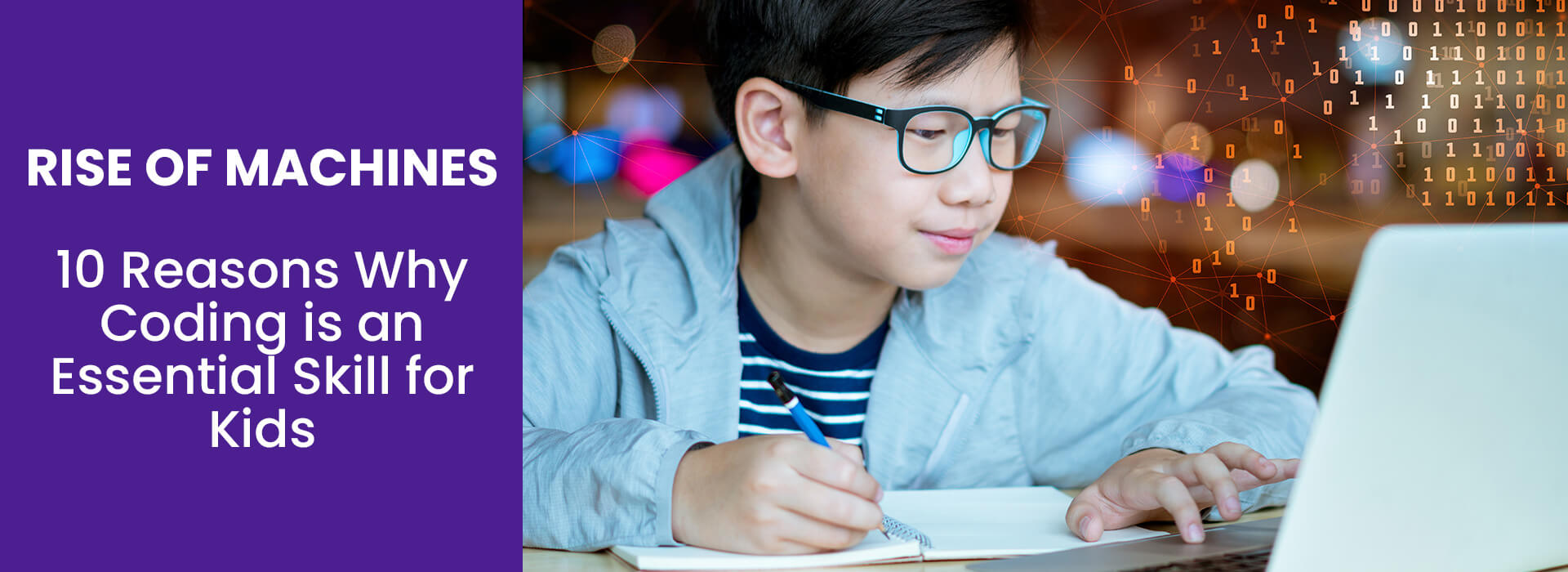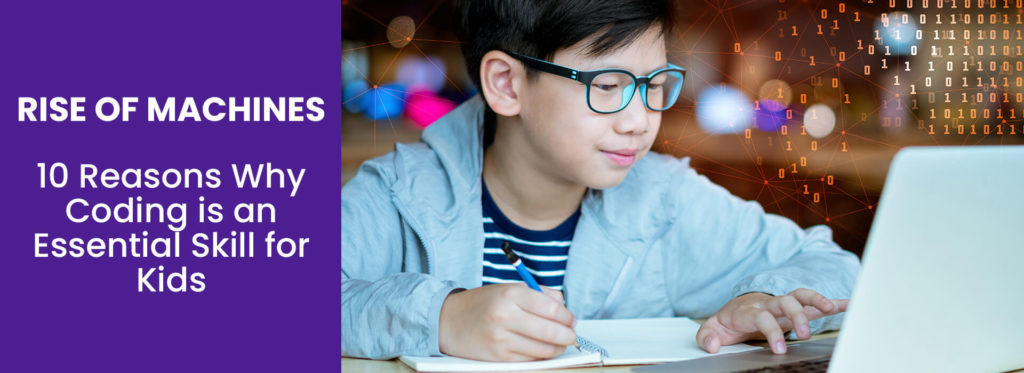
Update: This article was last updated on 21st January 2026 to reflect the accuracy and up-to-date information on the page.
Coding and children! Do they rhyme? The answer is a big no. But can you fit the fun and engaging world of coding into the beautiful world of the little ones? The world they build with Legos, decorate with toys, and splash with colors of innocence! The answer is a resounding yes!
No issues! But when you look at the data, you will get a jolt, and it will force you to think otherwise. The Smithsonian Science Education Center reveals that STEM (Science, Technology, Engineering, and Math) occupations out-earn non-STEM fields by 12-30% across all education levels. STEM jobs have doubled as a proportion of all jobs since the Industrial Revolution.
According to a McKinsey report, the technological revolution’s impact will require as many as 375 million workers globally to switch occupations or gain new coding skills by 2030. Moreover, 60 percent of occupations have at least 30 percent of constituent work activities that could be automated by 2030 globally. These include jobs in robotics, automation, AI, and App Development, all of which are interdependent on coding skills.
Phew! The numbers are mind-boggling. All STEM fields, including robotics, automation, AI, App Development, and others, will be interdependent on coding skills. Are you still in two minds about introducing your child to computing? Are you one of those who are fighting against implementing coding skills in the school curriculum?What happens when you leave your little ones with colors and canvas? They let their imagination fly and introduce you to their hidden feelings and emotions with a splash of colors on the canvas. You get to see the creative side of your children when you leave them alone with the Legos.
Just as they use the blocks to create their inner world in various shapes and sizes, when those little fingers fly on the computer keyboards to code a new matrix, they can unleash a new creative side. Coding not only allows them to create a different world with the power of computing but also fosters problem-solving skills and enhances their creativity.The discourse about children learning to code is crucial because the world is changing rapidly, and it is our responsibility to empower our children. They should be able to ride the changing tides with élan, and coding is a significant tool in this journey.
A report by the World Economic Forum forecasts that in 2025, machines will perform more current work tasks than humans, compared to 71% currently performed by humans. The rapid evolution of machines and algorithms in the workplace could create 133 million new roles in place of 75 million that will be displaced between now and 2022. So, can you imagine a world 15 years from now? Can you imagine your child struggling to survive the wave of rapid change? Exposure to technology at an early age can help them understand the importance of technology, and they can use this power of knowledge to open various avenues for themselves.
What is Coding?
Coding creates a set of instructions for computers to follow. These instructions determine what actions a computer can and cannot take. Coding skills allow programmers to build programs such as websites and apps. Computer programmers can also tell computers how to process data better and faster.
How Does Coding Work?
To communicate with computers, programmers develop various coding skills by learning different coding languages. The primary language of all computers is binary code, which consists of only two numbers: zero and one. In binary, zero represents “off,” while one represents “on.”
Binary is still widely used in electronics and computer hardware. By working with binary, programmers can control the flow of electricity and the positive and negative poles of a magnet. Binary code is a system of representing numbers, letters, and symbols using only two digits: 0 and 1. In binary, zero represents ‘off,’ while one represents ‘on.’
Why is Learning Coding Vital?
Technological skills are survival tools for the future. Coding is an essential skill in today’s world, and it will have an even bigger impact and role to play in the future. So much so that across the globe, a process to include coding in the school curriculum has already started.
Statistics projecting a futuristic work ecosystem have made it mandatory to move. The STEM education stats say that by 2018, 2.4 million STEM jobs will go unfilled. Others say that 71% of all new jobs in STEM are in computing, but only 8% of STEM graduates are in Computer Science.
Coding is no longer just an extracurricular activity but a full-fledged life skill that reaps several beneficial rewards.

Prashant Pundir

Coding is not just an extra classroom activity anymore, but a full-fledged life skill that reaps several beneficial rewards.
Here are some of the benefits of coding:
1. Coding Boosts Career Opportunities
In today’s highly skilled world of incredible competitiveness, children are required to punch above their weights and possess futuristic and in-demand skills. Coding is no longer just a cool skill to have; jobs related to coding and computers are growing at a rapid pace, much more so than other jobs around the nation.
The world is moving online, and in these digitized times, coding professionals are extremely well-paid.
2. Future Belongs to the Robots
We live in remarkable times where a machine exists for nearly every human activity, performing tasks at an incredibly fast pace. We communicate with machines in cars, listen to music on them, control lights through them, and much more. All of these machines rely on coding to function. Therefore, it is essential for children to develop coding skills, helping them better understand how these machines operate. Learning to code also opens up numerous employment opportunities for a highly automated future. Before long, coding will become as relevant in our lives as any human language.
3. Coding Belongs to the 21st Century
Coding is an amalgamation of various computer programming languages, such as Java, HTML, Python, etc. Understanding how these languages make everything function smoothly is important and instrumental to success. Coding is the literature of the digital world.
4. Coding is Creativity
Coding triggers children’s creative headspace. It provides a great boost in self-confidence, and children start thinking innovatively and desire to create something on their own. This desire is further enhanced by engaging in coding classes for kids. Coding is a great way to elicit the genius of young minds. It is important to inspire children to create more, and this is what coding does to them.
5. Coding Skills Fosters Math Skills
Maths is a complex subject, or is it? Well, when you learn to code, it isn’t so typical. In fact, it helps children to understand seemingly impenetrable abstract concepts and apply math to real-time situations. Coding is an integral part of various STEM programs as it also fosters algebraic and arithmetic skills.
6. Coding Means Resilience and Persistence
It is important to be graceful in your failures and portray the will to keep learning. Coding helps children understand that spontaneous results are mostly transitory and that you have to take the hard route to success. This is because children fail various times when they start to learn to code.
They keep digging it out the hard way until they get their desired result. Such rigorous discipline helps children tackle future difficulties better.
7. Coding Enhances Problem-solving Skills in Children
As Dan Crow, CTO of Songkick, explains, “Computational thinking teaches you how to tackle large problems by breaking them down into a sequence of smaller, more manageable problems.”
Don’t we visualize coding as something very complex and a network of tricky programs? If that’s the case, then those who are exposed to coding at an early age learn how to solve the most difficult problems because they can identify routes to solutions. Coders start to see complexities as easy-going, understandable lessons. Problem-solving is a very useful trait, and that is why the educational system needs to inculcate coding in its curriculum and teach children to see things deeply and intricately.
8. Coding Provides a Better Understanding of the World
It is important to understand how our surroundings work and also those who accompany us in them. Coding is a wonderful and very helpful substitute for children on the autism spectrum. Coding programs help these children explore various concepts that make their lifestyles and daily household routines more convenient.
Moreover, as discussed earlier, understanding coding helps us develop a relationship with the devices and technology that we are surrounded by and interact with daily.
9. Coding skills Improves Academic Performance
There is always a structured way of learning that helps children utilize their time effectively. Coding allows children to create segregations and divide their tasks in an organized manner.
Creating coding programs in such a way helps them take short steps towards learning, idea testing, and further establishing logical patterns. This experiential form of learning is the future, and that is what coding provides to children. It thrives on building computational skills.
10. Coding is Fun-learning
Children are much more likely to learn and grasp ideas at their age than adults. They have fewer mental barriers and a youthful determination to take up new challenges. Coding is fun to learn, with endless growth opportunities. The usefulness of coding in today’s world is at an all-time high, and if you know coding, you know how to rule the world.
Children can make apps, video games, websites and so much more. Learning to code is a hands-on experience for children which helps them to understand coding concepts that are extremely educative and helpful.
Moonpreneur is on a mission to disrupt traditional education and future-proof the next generation with holistic learning solutions. Its Innovator Program is building tomorrow’s workforce by training students in AI/ML, Robotics, Coding, IoT, and Apps, enabling entrepreneurship through experiential learning.

























